創建一個測試數據表 對UNION 和UNION ALL 進行比較: 在MySQL 5.1中文手冊中有下麵一句話: 如果您對UNION不使用關鍵詞ALL,則所有返回的行都是唯一的,如同您已經對整個結果集合使用了DISTINCT。如果您指定了ALL,您會從所有用過的SELECT語句中得到所有匹配的行。 ...
創建一個測試數據表
CREATE TABLE `temp_table` ( `id` int(11) NOT NULL AUTO_INCREMENT, `name` varchar(255) NOT NULL, `endtime` int(10) NOT NULL, `basic_sort` smallint(8) NOT NULL, `type` tinyint(1) NOT NULL, PRIMARY KEY (`id`) ) ENGINE=MyISAM DEFAULT CHARSET=utf8
對UNION 和UNION ALL 進行比較:
在MySQL 5.1中文手冊中有下麵一句話:
如果您對UNION不使用關鍵詞ALL,則所有返回的行都是唯一的,如同您已經對整個結果集合使用了DISTINCT。如果您指定了ALL,您會從所有用過的SELECT語句中得到所有匹配的行。
插入測試數據:
INSERT INTO `temp_table` (`name`,`endtime`,`basic_sort`,`type`) VALUES ('a', '1534349307', '10', '2');
INSERT INTO `temp_table` (`name`,`endtime`,`basic_sort`,`type`) VALUES ('a', '1534349308', '14', '2');
INSERT INTO `temp_table` (`name`,`endtime`,`basic_sort`,`type`) VALUES ('c', '1534349309', '12', '1');
INSERT INTO `temp_table` (`name`,`endtime`,`basic_sort`,`type`) VALUES ('d', '1534349310', '12', '1');

(SELECT id,name,endtime,basic_sort,type from temp_table where type=1) UNION (SELECT id,name,endtime,basic_sort,type from temp_table where type=2);
(SELECT id,name,endtime,basic_sort,type from temp_table where type=1) UNION ALL (SELECT id,name,endtime,basic_sort,type from temp_table where type=2);
對於上面兩句分別是UNION和UNION ALL組合,但是得到的結果是一致的。

其實上面說的【所有返回的行都是唯一的】這裡所說的是主鍵唯一:
(SELECT id,name,endtime,basic_sort,type from temp_table) UNION (SELECT id,name,endtime,basic_sort,type from temp_table);

(SELECT id,name,endtime,basic_sort,type from temp_table) UNION ALL (SELECT id,name,endtime,basic_sort,type from temp_table);
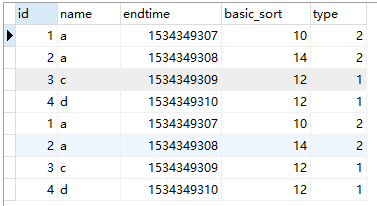
這裡對於UNION返回的結果相當於對主鍵做一次DISTINCT,而UNION ALL 返回的結果相當於是單純把結果查詢出來然後合併返回。
對UNION查詢結果進行排序:
插入測試數據(將剛剛的表內容刪減,使用TRUNCATE `temp_table`):
INSERT INTO `temp_table` (`name`,`endtime`,`basic_sort`,`type`) VALUES ('a', '1534349307', '10', '2');
INSERT INTO `temp_table` (`name`,`endtime`,`basic_sort`,`type`) VALUES ('b', '1534349308', '14', '2');
INSERT INTO `temp_table` (`name`,`endtime`,`basic_sort`,`type`) VALUES ('c', '1534349309', '12', '2');
INSERT INTO `temp_table` (`name`,`endtime`,`basic_sort`,`type`) VALUES ('d', '1534349310', '12', '2');
INSERT INTO `temp_table` (`name`,`endtime`,`basic_sort`,`type`) VALUES ('e', '1534349311', '18', '2');
INSERT INTO `temp_table` (`name`,`endtime`,`basic_sort`,`type`) VALUES ('f', '1534349312', '18', '2');
INSERT INTO `temp_table` (`name`,`endtime`,`basic_sort`,`type`) VALUES ('aa', '1534349313', '11', '1');
INSERT INTO `temp_table` (`name`,`endtime`,`basic_sort`,`type`) VALUES ('bb', '1534349314', '11', '1');
INSERT INTO `temp_table` (`name`,`endtime`,`basic_sort`,`type`) VALUES ('cc', '1534349315', '13', '1');
INSERT INTO `temp_table` (`name`,`endtime`,`basic_sort`,`type`) VALUES ('dd', '1534349316', '12', '1');
INSERT INTO `temp_table` (`name`,`endtime`,`basic_sort`,`type`) VALUES ('ee', '1534349317', '12', '1');
INSERT INTO `temp_table` (`name`,`endtime`,`basic_sort`,`type`) VALUES ('ff', '1534349318', '15', '1');
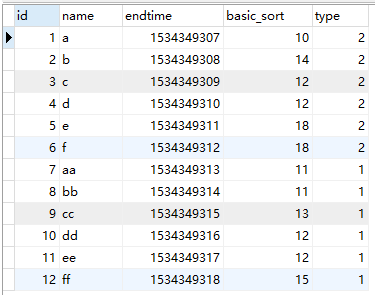
這裡我們想要得到的結果是:按type的正序排序,接著按basic_sort倒敘排序
(select * from temp_table where type=1 ORDER BY basic_sort desc) union (select * from temp_table where type=2 ORDER BY basic_sort desc)
對於這樣的SQL語句得到的結果是:
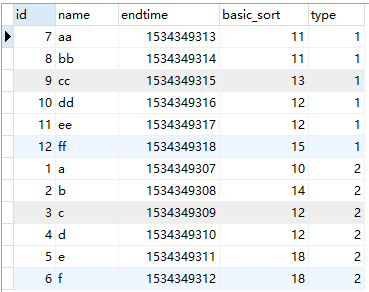
與沒有在子句中使用ORDER BY的結果一致。
(select * from temp_table where type=1) union (select * from temp_table where type=2)
在MySQL 5.1中文手冊中有下麵兩句話:
1、如果您想使用ORDER BY或LIMIT子句來對全部UNION結果進行分類或限制,則應對單個地SELECT語句加圓括弧,並把ORDER BY或LIMIT放到最後一個的後面。
如果要完成上面的需求應該是:
(select *,type as sort_type,basic_sort as sort_value from temp_table) union (select *,type as sort_type,basic_sort as sort_value from temp_table) order by sort_type ASC,sort_value ASC
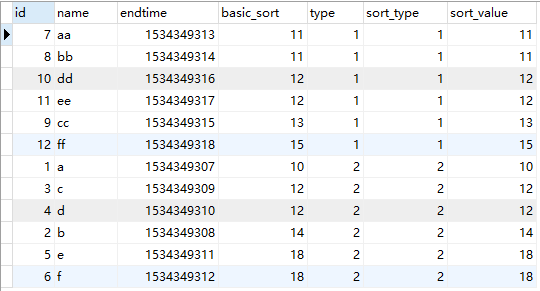
2、圓括弧中用於單個SELECT語句的ORDER BY只有當與LIMIT結合後,才起作用。否則,ORDER BY被優化去除。
(select * from temp_table WHERE type=1 ORDER BY basic_sort ASC LIMIT 6) union (select * from temp_table WHERE type=2 ORDER BY basic_sort ASC LIMIT 6)
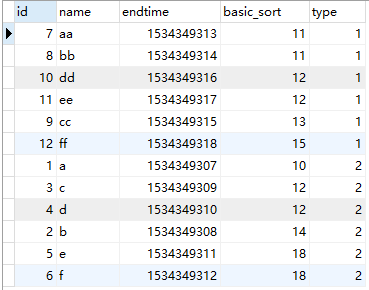
關於這裡是可以使用ORDER BY 與LIMIT 共同完成,但是有些時候我們不能在裡面用LIMIT 只能在外面用,比如我們做分頁,我們並不知道應該在裡面LIMIT 多少才對。
下麵這裡有個奇怪的需求,我們需要得到下麵一個這個列表,首先是按type正序排列,當type為1的時候是按照basic_sort進行正序排列,當type為2的時候按endtime倒敘排列。
因為對於type為1的時候我們不需要對endtime進行排序所以我們在type為1的時候設置endtime的值為0,對於type為2的時候我們不需要basic_sort的值進行排序,所以設置basic_sort的值為0。
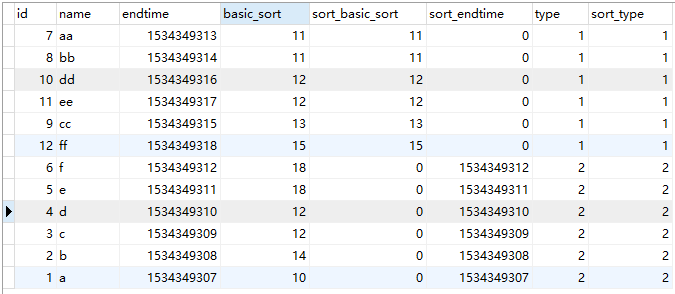
(SELECT id,name,endtime,basic_sort,basic_sort as sort_basic_sort,0 as sort_endtime,type,type as sort_type FROM temp_table WHERE type=1) union (SELECT id,name,endtime,basic_sort,0 as sort_basic_sort,endtime as sort_endtime,type,type as sort_type FROM temp_table WHERE type=2) ORDER BY sort_type ASC,sort_basic_sort ASC,sort_endtime DESC



